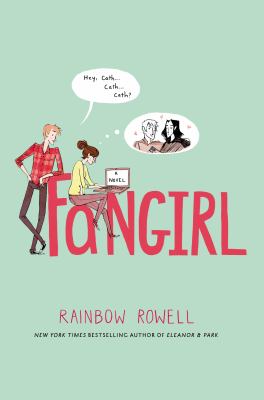
Almost anyone can vouch that starting at a new school is scary. I’m sure that everyone can also vouch that having to make all completely new friends can also seem like a daunting task. Fangirl by Rainbow Rowell is a book that completely encompasses the struggles of a teenage girl in her attempt to be independent from her twin sister, follow her academic dream of becoming a writer, and navigate college social life. The story revolves around Cath, a quirky, shy, slightly nerdy freshman in college whose twin sister, Wren, has decided that she wants to be more independent and branch out more socially. Cath struggles to make new true friends, until finding solace in her brooding roommate, Reagan, and her close friend, Levi. Rainbow Rowell captures the nervousness of a first-day college student that anyone starting at a new school can relate to, the feeling of loneliness when a longtime friend no longer seems close, and the awkward phases of friendship that come with building relationships with new people.
Cath’s passion is writing fanfiction for the Simon Snow series, and she struggles with the fact that she may not be able to hold on to the fictional characters forever if she wants a chance at becoming an author. Her professor pushes her to think outside the Simon Snow bubble, yet Cath has a hard time with her new assignments because of her attachment to fanfiction. The Simon Snow series, representative of Cath’s youth and innocence, serves as a major symbol throughout the novel. As people in Cath’s life relentlessly attempt to cut her off from that tie to her old life, she hangs on desperately to the last bit of innocence that she has. Cath’s decision at the end of the novel that she doesn’t have to give up Simon Snow and fanfiction to become an author proves that a coming-of-age story doesn’t necessarily mean losing all youth.
Cath’s relationship with her sister and with Reagan and Levi are two common examples of separation and unlikely bonds. When Wren starts accustoming herself to college life, Cath feels like she doesn’t really know who she is anymore. A teenage audience especially can relate to the idea of an old friend changing, and with that change, a strained friendship may result. Reagan, on the other hand, is standoffish, harsh, and the complete opposite of Cath, yet they build an unlikely friendship that helps Cath get through her freshman year. Because of Reagan, Cath is introduced to Levi, the first boy she ever loves, and the person who truly pushes her to find herself.
Rowell also touches on deep family issues in the novel. Cath and Wren lived the majority of their life with their father after their mother left them when they were in elementary school, and when she attempts to return to their lives, the twins receive her with mixed reactions. Cath struggles with the idea that Wren wants to build a relationship with their mother, while also feeling the responsibility to take care of their mentally unstable father. It’s important for readers to understand that almost every family has some dysfunction, and that it’s nothing to be ashamed of, but something that can only make you stronger with the support of the right people.
Besides the fact that I loved the book, I think that it’s important for teenagers to read Fangirl. The novel by Rowell puts a lot of things into perspective: school, family, relationships, dreams. I think that something teenagers can relate to in this world is knowing that they’re not the only one who feels the same way they do. Everyone is a little lost, a little unsure, and a little scared. But being able to chase your dreams without compromising the things and the people you love is something that we all should be working towards, no matter the age. I give the book a solid 4 out of 5 stars and label it a “must-read” for teens.
Check out Fangirl at the Newport Beach Public Library.